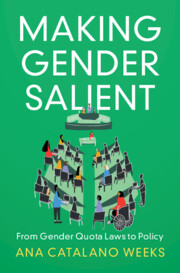Book contents
- Frontmatter
- Dedication
- Contents
- List of Figures
- List of Tables
- Acknowledgments
- 1 Introduction
- 2 When Do Quotas Matter? A Theory of the Substantive Representation of Cross-Cutting Interests
- 3 What Do Women Want? Gender Gaps in Preferences
- 4 The First Stage of Policy Change: The Effects of Quotas on Party Priorities
- 5 The Effects of Gender Quota Laws on Work–Family Policies
- 6 How Gender Quota Laws Change Work–Family Policies
- 7 Conclusion
- Appendix
- References
- Index
2 - When Do Quotas Matter? A Theory of the Substantive Representation of Cross-Cutting Interests
Published online by Cambridge University Press: 09 June 2022
- Frontmatter
- Dedication
- Contents
- List of Figures
- List of Tables
- Acknowledgments
- 1 Introduction
- 2 When Do Quotas Matter? A Theory of the Substantive Representation of Cross-Cutting Interests
- 3 What Do Women Want? Gender Gaps in Preferences
- 4 The First Stage of Policy Change: The Effects of Quotas on Party Priorities
- 5 The Effects of Gender Quota Laws on Work–Family Policies
- 6 How Gender Quota Laws Change Work–Family Policies
- 7 Conclusion
- Appendix
- References
- Index
Summary
This chapter offers a new theory about the conditions under which gender quotas are most likely to matter for policy outcomes. Building on Mansbridge’s concept of “uncrystallized interests”, I argue that when new policy demands cut across the main left-right (class-based) policy dimension, and the group demanding change faces high barriers to entry in politics, the result is that these issues are often ignored. Parties have little incentive to address issues that cut across the main left-right dimension in politics because they distract from core issues and divide key constituencies. If the groups that support these issues are underrepresented in parties and lack the resources to form a new party, the result is what I call a political market failure -- the issue remains off the agenda. Gender quotas prevent the political dominance of men, and they also signal a new commitment to gender-related concerns. I suggest that quotas are most likely to lead to policy change on those “uncrystallized” issues characterized by: 1) a gender gap in preferences, and; 2) cross-cutting support. The chapter then spells out three main mechanisms through which quotas lead to policy change: factions, ministers, and salience. The final section outlines key assumptions and scope conditions.
Keywords
- Type
- Chapter
- Information
- Making Gender SalientFrom Gender Quota Laws to Policy, pp. 22 - 46Publisher: Cambridge University PressPrint publication year: 2022



